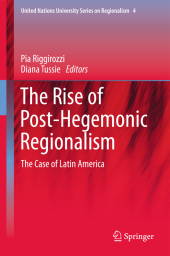 Neuerscheinungen 2014Stand: 2020-02-01 |
Schnellsuche
ISBN/Stichwort/Autor
|
Herderstraße 10
10625 Berlin
Tel.: 030 315 714 16
Fax 030 315 714 14
info@buchspektrum.de |

Pía Riggirozzi, Diana Tussie
(Beteiligte)
The Rise of Post-Hegemonic Regionalism
The Case of Latin America
Herausgegeben von Riggirozzi, Pía; Tussie, Diana
2012. 2014. xviii, 194 S. 5 SW-Abb.,. 235 mm
Verlag/Jahr: SPRINGER NETHERLANDS; SPRINGER, BERLIN 2014
ISBN: 9400798997 (9400798997)
Neue ISBN: 978-9400798991 (9789400798991)
Preis und Lieferzeit: Bitte klicken
This analysis of one of the central issues of the our times focuses on Latin America, providing the first in-depth and empirically driven analysis of the models of regional governance in Latin America that have now emerged out of the ´crisis of liberalism´.
This book offers a timely analysis, and a novel and nuanced argument about post-neoliberal models of regional governance in non-European contexts. It provides the first in-depth, empirically-driven analysis of current models of regional governance in Latin America that emerged out of the crisis of liberalism in the region. It contributes to comparative studies of the contemporary global political economy as it advances current literature on the topic by analysing distinctive, overlapping and conflicting trajectories of regionalism in Latin America. The book critically explores models of transformative regionalism and specific dimensions articulating those models beyond neoliberal consensus-building. As such it contests the overstated case of integration as converging towards global capitalism. It provides an analytical framework that not only examines the ´what, how, who and why´ in the emergence of a specific form of regionalism but sets the ground for addressing two relevant questions that will push the study of regionalism further: What factors enable or constrain how transformative a given regionalism is (or can be) with respect to the powers and policies of states encompassed by it? and: What factors govern how resilient a given regionalism is likely to be under changing political and economic conditions?
1. The Rise of Post-Hegemonic Regionalism in Latin America; Pía Riggirozzi and Diana Tussie.- 2. Reconstructing Regionalism in Latin America: What Does Development Have To Do With It?; Pía Riggirozzi.- 3. Consistency and Resilience through Cycles of Repolitization; Olivier Dabène.- 4. Infrastructure: Learning and Cooperation for the Provision of Regional Public Goods ; Ricardo Carciofi.- 5. Defence in a Post Hegemonic Regional Agenda: The Case of the South American Defence Council ; Jorge Battaglino.- 6. The Rise of Monetary Agreements in South America ; Pablo Trucco.- 7. Socio-Environmental Regionalism in South America: Tensions in New Development Models; Marcelo Saguier.- 8. Regionalism and Civil Society: Bridging the Democratic Gap?; Andres Serbín).- 9. Moving Regions: Brazil´s Global Emergence and the Redefinition of Latin American Borders; Andres Malamud.- 10. Postlude; Pía Riggirozzi and Diana Tussie.-
From the reviews:
"Examine how regional projects in the Americas are adapting, emerging and evolving independent of the hegemonic influence of the United States. ... For scholars of inter-American affairs and regionalism this book serves as an important touchstone summarizing the current state of affairs in Latin America. ... For the non-specialist and busy policy-maker ... it provides a clear, concise and sophisticated survey of the major regional processes and challenges that matter. ... should be read by generalists turning their attention to the Americas." (Sean Burges, International Affairs, Vol. 89 (2), March, 2013)


